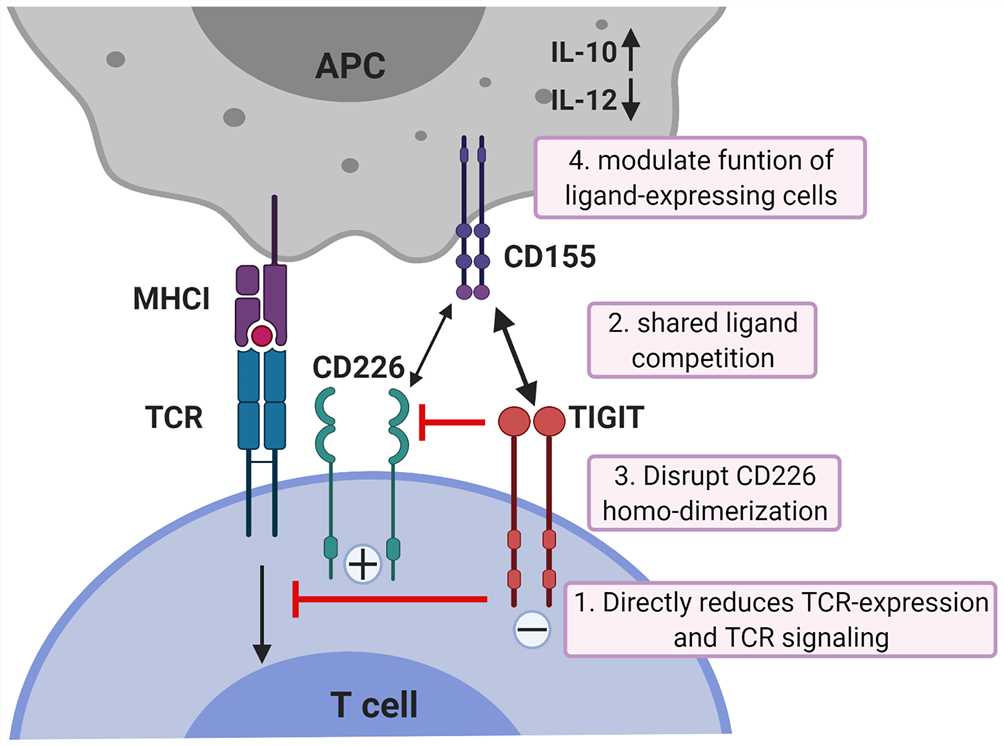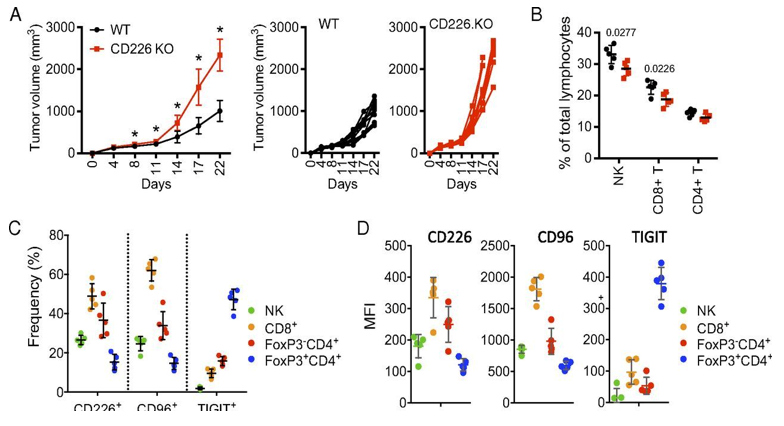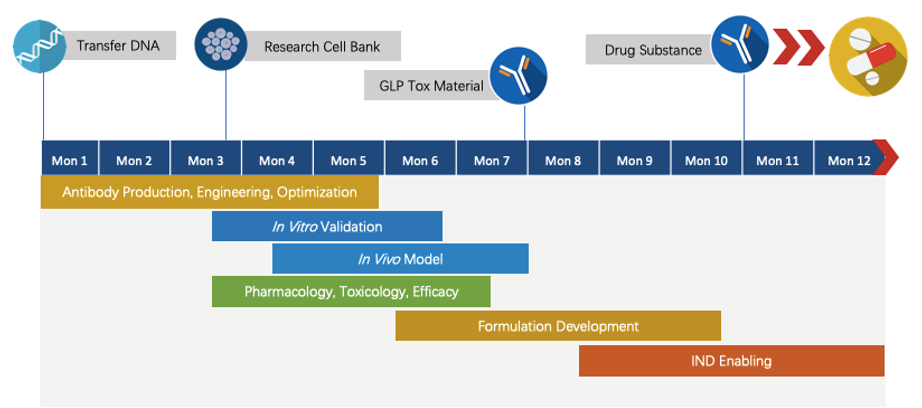About This Program
This program aims to develop anti-CD226 therapeutic monoclonal antibody for immuno-oncology.
Studies have shown that CD226 is an important activating receptor in the context of NK cell-mediated tumor cell elimination. Antibody blockade of CD226 was able to inhibit human NK cells from killing hematopoietic and non-hematopoietic tumor targets. Data also have suggested that CD226 ligand expression is often up-regulated in cellular stress responses. Increased expression of CD226 ligands CD155 and CD112 are observed in many tumor cell lines, particularly those of epithelial or neuronal origin, such as carcinoma and melanoma. These data highlight a clear rationale for anti-CD226 antibody-based cancer immunotherapy.
CD226
CD226, also known as DNAM-1, is an Ig-like family glycoprotein belonging to the poliovirus receptor (PVR)-lectin family, mainly expressed in NK cells and T cells. Other members of this family include the T cell Ig, ITIM domains (TIGIT), and CD96, which compete for ligand binding to CD226. The ligand for CD226 is CD155 (also known as "PVR") and nectin CD112, which has a higher affinity for CD155.
Highlights:
-
Anti-CD226 antibodies are shown to promote NK cell activation by immunoreceptor tyrosine tail (ITT)-like motifs conjugated to CD226 and GRB2 adaptor proteins.
-
A novel pathway, platelet-derived TGFβ-mediated inhibition of the CD226/CD96-CD112/CD155 axis, inhibits NK cell function and promotes tumor cell survival.
 Fig.1 TIGIT (VSTM3)/CD226 pathway.3
Fig.1 TIGIT (VSTM3)/CD226 pathway.3
CD226 in Cancer Studies
Up to date, as a newly identified target, the immune‑regulatory effect of CD226 antibody in the tumor microenvironment has only be investigated in a few studies. Here are some published data about CD226 molecule as a potential target for cancer immunotherapy.
-
Blocking CD226 on the NK cell-induced a marked inhibition of NK functions for both activity and cytokine production.
 Fig.2 Blocking CD226 on the NK cell-induced a marked inhibition of NK functions for both activity and cytokine production.1
Fig.2 Blocking CD226 on the NK cell-induced a marked inhibition of NK functions for both activity and cytokine production.1
-
CD226 deficiency enhances CT26 tumor growth and regulates gene expression in tumor-infiltrating NK cells.
 Fig.3 CD226 deficiency enhances CT26 tumor growth and regulates gene expression in tumor-infiltrating NK cells.2
Fig.3 CD226 deficiency enhances CT26 tumor growth and regulates gene expression in tumor-infiltrating NK cells.2
Indication
CD226 is an important activating receptor involved in mediating natural killer (NK) cell responses against tumors. Based on the published data, CD226 is highly expressed in a variety of tumor settings, such as melanoma, ovarian cancer, and colorectal cancers. We plan to develop multiple programs (not limited to one specific type), in which CD226 is highly expressed.
Clinical Trials under Progress
To our knowledge, there are NO ongoing clinical trials of anti-CD226 therapeutic monoclonal antibody. Our program will be a pioneer in the development of CD226 antibody.
Program Plan
We have extensive knowledge of end-to-end program development. For each program, we are committed to delivering the final complete program to our clients within 1.5 years prior to entering the IND stage.
 Fig.4 The timeline of Next-IOᵀᴹ programs.
Fig.4 The timeline of Next-IOᵀᴹ programs.
Cooperation
Creative Biolabs is looking for potential partners (include but not limit to major pharma or biotech firms) to develop anti-CD226 therapeutic monoclonal antibody program together. Our scientists are dedicated to bringing together years of valuable experience to our partner and achieve a meaningful partnership. By doing so, we wish to help both parties to proceed with IND and many stages of clinical trials beyond.
If you are interested, please feel free to contact us so that we can discuss the program and other possible opportunities for cooperation. Look forward to working with you in the near future.


 Fig.1 TIGIT (VSTM3)/CD226 pathway.3
Fig.1 TIGIT (VSTM3)/CD226 pathway.3
 Fig.2 Blocking CD226 on the NK cell-induced a marked inhibition of NK functions for both activity and cytokine production.1
Fig.2 Blocking CD226 on the NK cell-induced a marked inhibition of NK functions for both activity and cytokine production.1
 Fig.3 CD226 deficiency enhances CT26 tumor growth and regulates gene expression in tumor-infiltrating NK cells.2
Fig.3 CD226 deficiency enhances CT26 tumor growth and regulates gene expression in tumor-infiltrating NK cells.2
 Fig.4 The timeline of Next-IOᵀᴹ programs.
Fig.4 The timeline of Next-IOᵀᴹ programs.
 Download our brochure
Download our brochure